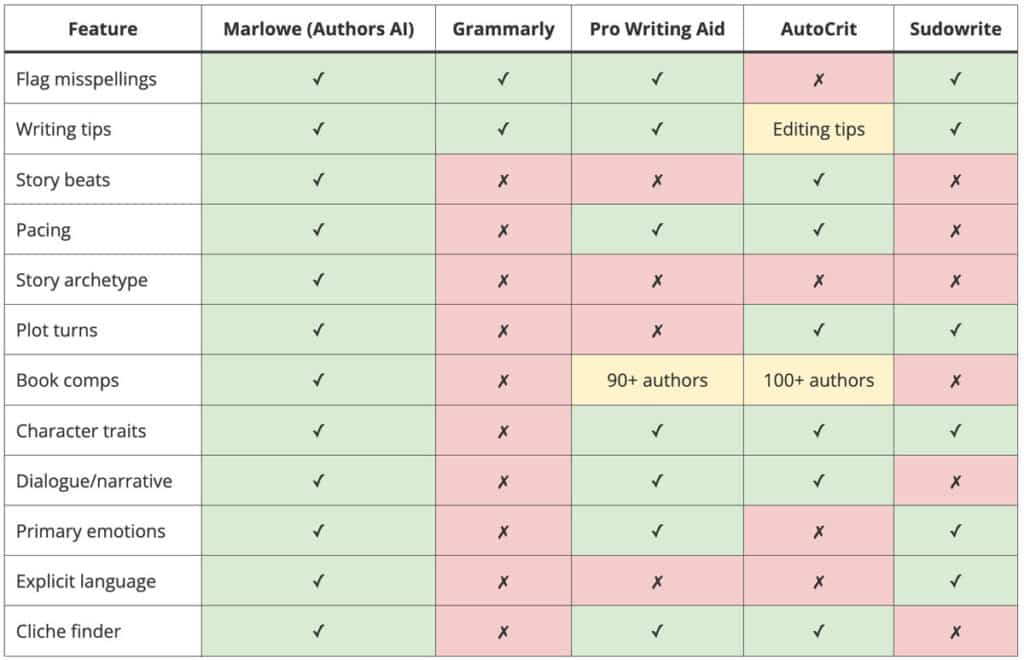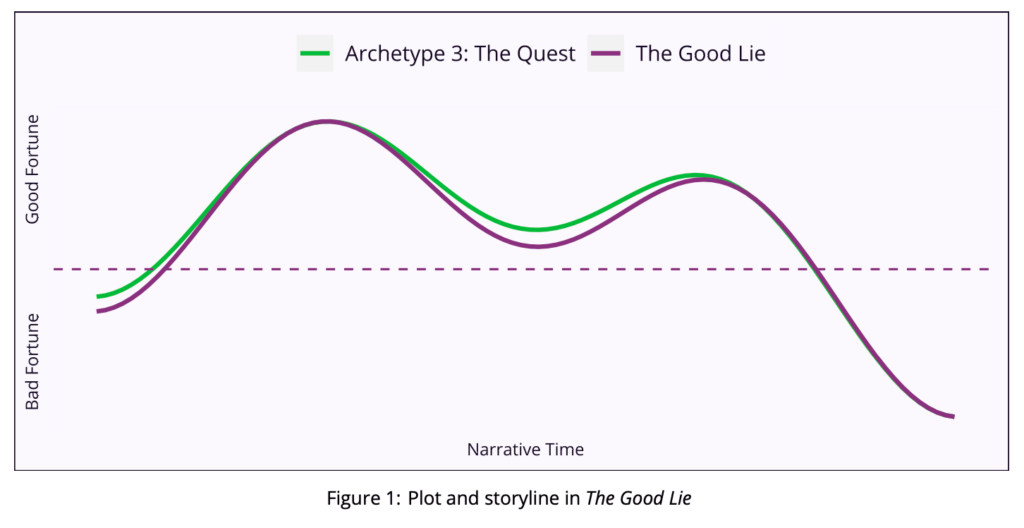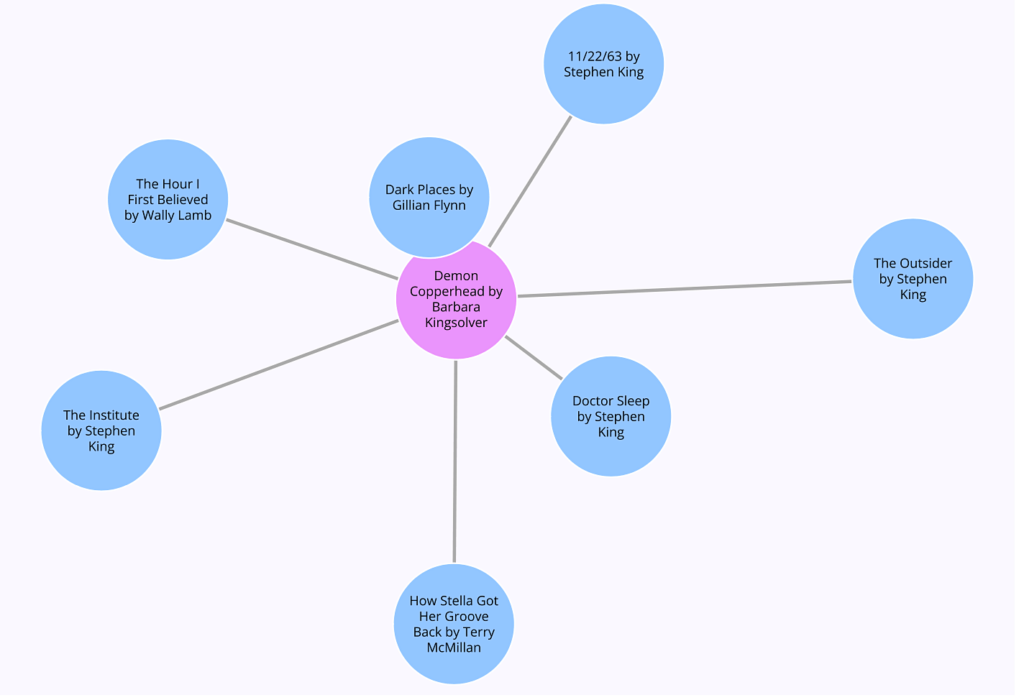Every author knows we need a lot of tools in our arsenal to write the best books possible and reach as many folks as we can. And no two authors are alike.
So let’s focus on the writing bit today, because there are just a handful of tools that come to mind when it comes to tools that increase our writing proficiency — and that ultimately help us sell more books.
When people come to authors.ai, they want to know how Marlowe — our fiction-trained AI and virtual editor — stacks up against the competition. Which of the other tools are complementary or overlap with what Marlowe delivers. Let’s dive in!
A chart for easy comparisons
Today we’re unveiling a table that gives you a quick, at-a-glance comparison of the major author tools. See our Author tools comparison page.

Now, we could do a review of each of these services, but as a tool provider ourselves, it makes more sense to point out the features we have and what other tools you might want to add to your toolkit.
Misspellings
As a thriller author, I usually don’t worry too much about misspellings until I’m done with my first draft. Fixing misspellings comes in at the rewrite stage. Depending on what software you use to write, you may use a spellcheck checker in Microsoft Word or a Grammarly plug-in to do this. Marlowe provides a separate section on possible misspellings so you don’t have to scroll through an 80,000-word manuscript to see which words are flagged.
Writing tips
This is a bit of a grab bag. What constitutes good writing? Partly it’s storytelling but partly it’s knowing how to make your writing stand out with memorable characters, vivid settings and writing that eschews the passive voice in favor of strong, active verbs, no-nonsense nouns, few adjectives and fewer adverbs. Marlowe flags overused words and phrases and gives you a count of how many times you use a certain adjective or adverb — as we’re all wont to do.

Story beats
Story beats, or narrative beats, is an area where Marlowe outshines all the others. Veteran authors know the importance of spacing out story beats within a scene. But it’s even more important to make sure you place story beats — both positive and negative — at regular intervals throughout your story. About every 10 percent seems to be a good marker. Bestselling authors tell us they use Marlowe on first draft of their novel, then go back and rearrange some of the scenes or chapters to make sure major action scenes aren’t too close to each other and there no long sections where nothing significant is happening.
Pacing
Pacing is one of the toughest things to be aware of when you’re writing your novel. I’ve used Pro Writing Aid and AutoCrit but haven’t seen their pacing guidance. Marlowe provides a graphic that lets you see the overall pacing of your novel, which charts the hills and valleys of the narrative.

Story archetype
Few authors I know begin their story with an archetype or narrative arc in mind. I don’t know of any other author tools that offer, but I’ve found Marlowe’s archetype analysis useful whenever I approach the end of the first draft of a new work. (To understand archetypes better, see my article, Examples of narrative arcs in modern fiction.) At that point, you can say, Oh! I’ve written a Man in a Hole story, or a Quest or Rags to Riches tale. And then you can see how your story’s narrative shapes up against others that have followed the same story shape. You may want to make some adjustments accordingly to follow the general contours of one of these classic storytelling patterns that authors have been using for generations.
Plot turns
You know what makes a great page-turner? Lots of twists, turns and reversals. Marlowe provides a graph that shows the plot trajectory of a bestseller that is structured in a manner similar to your story. This does not necessarily mean that your book is at all similar in terms of subject matter or style, but it does suggest that the emotional experience of your readers will be similar. The Da Vinci Code and Fifty Shades of Grey are very different books, but it turns out they have very similar plot trajectories. Readers consistently describe both books as page-turners. Knowing about other books with similar plotlines will help you understand the experience readers will have as they traverse your narrative.

Book comps
As part of their Marlowe Pro report, authors who run a manuscript through our AI see a rich set of book comps, with your book assessed against the thousands of bestsellers in our data library. (We continue to expand our corpus every month.) If your book stacks up, you may see how closely your book compares to a title from Stephen King, Danielle Steel, Brandon Sanderson or, in my case, James Patterson. It’s a kick, and it’s also a positively affirming feeling. You may want to head to BingeBooks to buy their book to compare.
Other features
You’ll also find analysis of major character traits in Marlowe — as well as in Pro Writing Aid, AutoCrit and Sudowrite. Your mileage may vary. Similarly, you’ll find a breakdown of dialogue vs. narrative, a primary emotions color wheel and a helpful cliche finder.
One of my favorite features (which only Sudowrite has in this faceoff) is the explicit language finder. You’d be surprised how often you’ll find profane words in your manuscript that, at second blush, ought to come out during the second draft. Or, if you write saucy romance novels, you may decide that 900 f-bombs are a tad too much. (That’s right, we add ’em up for you.)
OK, that’s how Marlowe stacks up against some of the other major author tools in the market. There are others, of course: Hemingway, Ginger and Plottr, to name a few. And if you want a generative AI that turn out prose for you to consider, Sudowrite, Claude, ChatGPT and Gemini are your top options right now.
How about you? Do you have a favorite tool for your fiction writing that isn’t listed above? Tell us about your experience using Marlowe or one of the other tools out there.






